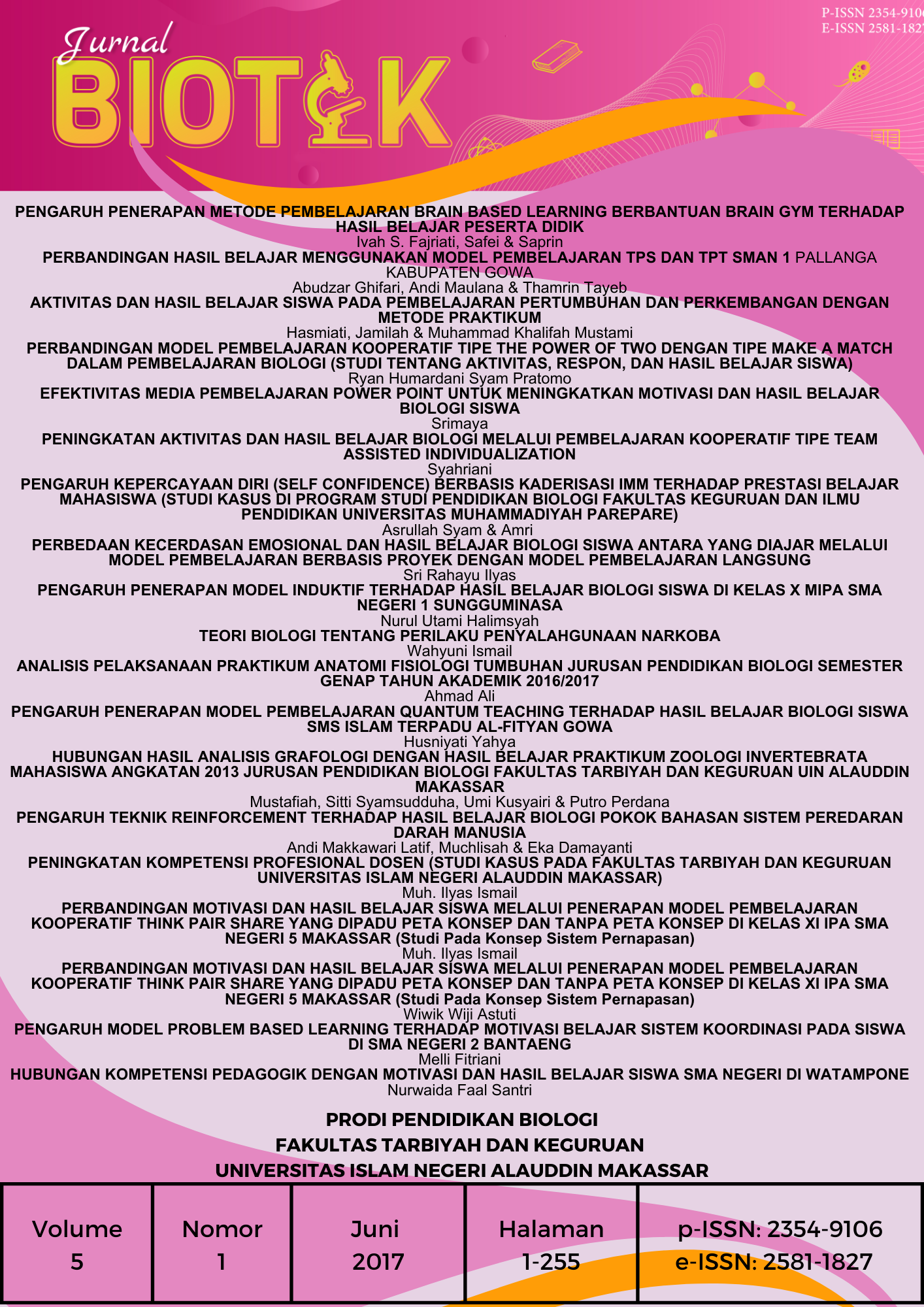PERBANDINGAN HASIL BELAJAR MENGGUNAKAN MODEL PEMBELAJARAN TPS DAN TPT SMAN 1 PALLANGA KABUPATEN GOWA
Abstract
This thesis discusses cooperative learning model that Think Pair Share and The Power of Two on the subject of the Digestive System Student Class XI SMAN 1 Pallangga. With the aim of research to find out whether there are differences in learning outcomes of students who are taught by koopertaif learning model Think Pair Share and The Power of Two on the subject of the digestive system of class XI student of SMAN 1 Pallangga. This research is experimental form of Quasi Experimental Design (quasi-experimental) design study is a "Posttest-Only Control Design". The study population was all students of class XI SMA Negeri 1 Pallangga. The research sample is class XI IPA4 as an experiment I and class II XI IPA7 as an experiment. Data collection was performed by using the test results in the form posttest study, observation and documentation. Data were analyzed using descriptive analysis techniques and inferential analysis techniques. Analysis of the data shows the results of student learning Class XI SMAN 1 Pallangga on the subject of the digestive system that is taught through cooperative learning model Think Pair Share and The Power of Two. First, the study of students who were taught through cooperative learning model Think Pair Share is in the low category with a percentage of 41.4% of 39 students and an average value of 54.25. Second, the study of students who were taught through cooperative learning model The Power of Two learning at high category with a percentage of 70% of the 30 students with an average value of 66.88. All three of the analytical results of hypothesis testing using t-test, thit value = 4.87 and ttab value = 1.67. Where the value of thit> ttab so H0 rejected, H1 accepted, thus there are differences in the average learning outcomes of students who were taught through cooperative learning model Think Pair Share and types The Power of Two on the subject of the digestive system of class XI SMA Negeri 1 Pallangga Gowa.
Downloads
References
Huda, Miftahul. (2013). Cooperative Learning. Yogyakarta: Pustaka Belajar.
Mafatih dan Bisyri, Ahmad. (2013). Makalah Strategi Belajar Dengan Cara Kooperatif Bidang Studi IPS, (http://media.diknas.go.id, Diakses 11 November 2013).
Purwanto, Ngalim. (2013). Psikologi Pendidikan. Jakarta: PT Remaja Rosdakarya.
Rahayu, Budi Arti. (2011). Penerapan Strategi Pembelajaran The Power Of Two dalam Upaya Peningkatan Hasil Belajar Aqidah Akhlak Siswa Kelas VII 1 MTS Syaroful Millah Penggaron Kidul Semarang. Skripsi. Semarang: Fakultas Tarbiyah Institut Islam Negeri Walisongo.
Sanjaya, Wina. (2009). Strategi Pembelajaran Berorientasi Standar Proses Pendidikan. Jakarta: Kencana Prenada Media Grup.
Sugiyono. (2011). Metode Penelitian Kuantitatif, Kualitatif dan R & D. Cet. XIII. Bandung: CV Alfabeta.
Sugiyono. (2013). Metode Penelitian Pendidikan. Cet.XVI. Bandung: Alfabeta.
Suryabrata, Sumadi. (2009). Metode Penelitian. Jakarta: Rajawali Pers.
Yahya. (2012). Penerapan Model Pembelajaran Kooperatif Tipe Think Pair Share (TPS) dalam Meningkatkan Prestasi Belajar Siswa Pada Materi Ciri-Ciri Makhluk Hidup di SMP Negeri 2 Sakti Kabupaten Pidie. Jurnal (online), Volume 13 Nomor 2, (http://www.serambimekkah.ac.id/download/September-2012.pdf, Diakses 2 Mei 2016).
Authors who publish with Jurnal Biotek agree to the following terms: Authors retain the copyright and grant Universitas Islam Negeri Alauddin Makassar right of first publication with the work simultaneously licensed under a Creative Commons Attribution License (CC BY-SA 4.0) that allows others to share (copy and redistribute the material in any medium or format) and adapt (remix, transform, and build upon the material) the work for any purpose, even commercially with an acknowledgement of the work's authorship and initial publication in Universitas Islam Negeri Alauddin Makassar. Authors are able to enter into separate, additional contractual arrangements for the non-exclusive distribution of the journal's published version of the work (e.g., post it to an institutional repository or publish it in a book), with an acknowledgement of its initial publication in Universitas Islam Negeri Alauddin Makassar. Authors are permitted and encouraged to post their work online (e.g., in institutional repositories or on their website) prior to and during the submission process, as it can lead to productive exchanges, as well as earlier and greater citation of published work (See The Effect of Open Access).

This work is licensed under a Creative Commons Attribution-ShareAlike 4.0 International License.



